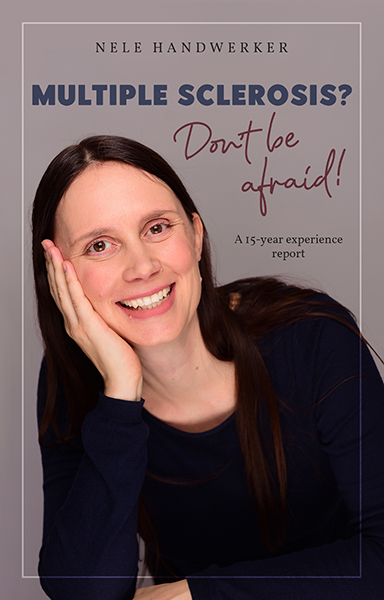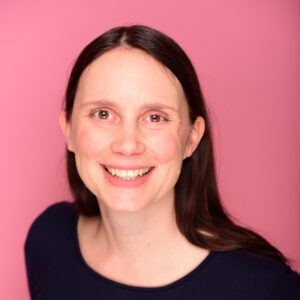Welcome to episode one of the podcast and correspondent blog article where I speak about my personal journey with MS so far. I have choosen all the questions that I’m going to ask my upcomoning interview partners about their life with multiple sclerosis. I think that is fair and maybe answers some questions you might have.
Klicken Sie auf den unteren Button, um den Podcast zu laden.
Table of Content
Introduction Nele Handwerker
I’m 42 years old and live in Pirna, near my hometown Dresden in Germany together with my husband, our daughter and two gerbils as pets. I love to be close to the elbriver, which I can see from our apartment and enjoy when going for a lunch walk. When I got married I took on my husbands surname. But I had started the German MS-Perspektive podcast already and so I decided to stay officially with my birth name. So nevermind if you see my picture and it says Nele von Horsten instead of Nele Handwerker.
I love reading and am a loyal subscriber of the National Geographic Magazine since 2002.
My garden is a mix of wild nature with a few berries and vegetables to eat and some flowers. I ride my bike every weekday to bring my daughter to kindergarten. I’m interested in many things and keep asking questions to learn and grow.

Diagnosis and status
When were you diagnosed with multiple sclerosis and what caused it?
I was diagnosed in summer of 2004 after the MRI showed new lesions in my brain. A year before I have had an opticus neuritis and was treated with cortisone. After an MRI by that time, neurological tests and getting a lumbar puncture where they found oligoclonal bands I received the diagnosis of a clinical isolated syndrome (CIS). I thought back then that the diagnosis of multiple sclerosis can be excluded for all times. I was not well enough informed to realize, that this was a prodromal phase and one year later with the new lesions my diagnosis was clear.
Did you have symptoms before that, in retrospect, were related to multiple sclerosis?
Not that I’m aware of. But I had an infection with Eppstein-Barr-Virus (EBV) when I was 14.
How did you take the diagnosis and what was it like for your loved ones?
I was shocked as I thought that the result of all testing a year before was excluding the MS diagnosis forever. At the beginning I was seeing totally black for my complete future. That I would be sitting in a wheelchair soon, being unemployed, without a significant other without any joy or happiness in life.
My parents and sister were shocked as well. That’s no diagnosis you want to receive for a loved one. My grandparents where afraid as well. But my aunt and uncle, both medical doctors told me about a few people the knew who had mild courses and could go on with their lives without much interfering of the MS. And my friends helped me a lot to become hopeful and positive again in a few weeks.
My boyfriend by then was no help at all as he was totally concentrated on his life and not willing to deal with such things. He was just not taking the situation serious.
Were you recommended disease-modifying therapies at the beginning and how did you decide?
In 2004 the knowledge about MS was much lesser. I was considered a mild version of MS and so no treatment was needed. The neurologist at the University Hospital in Dresden asked me if I would like to join a clinical trial where an active medication would be compared to a placebo. My uncle suggested not to do so, as it is quite some stress to live with that uncertainty and maybe not even getting an effect but lots of testing which can be time consuming. I followed his advice and stayed without medication for the next years until I got my second relapse during Christmas 2008. It was a numbness in my right arm and half of my upper right body, that didn’t go away. Only one more day in the office before Christmas vacation and just one month in my new job in Berlin. I was quite afraid, that I had to stay in the hospital for intravenous cortison.
I was driving with my boyfriend to Dresden and only told my dearest cousin about it. She told me to call the neurology department at the university hospital in Dresden. And surprise, surprise there was a newly established MS-Center. I went there and met for the first time Tjalf Ziemssen who became my neurologists and still is as of today. He told me that cortisone is not needed for such a mild relapse that is not much disturbing my normal life, but I should start an Immunotherapy.
He introduced three medications to me that were suitable for my disease-course and explained the pros and cons. Due to my job and travelling to Asia for business trips every now and then he recommended Copaxone to me which meant subcutaneous injections each day for the next years. But it worked quite well and after getting used to the syringes after a few months, it was okayish. I still don’t like syringes and better look off when somebody puts a needle into a body.
Have you had a change in therapy and if so, what prompted it?
No, I think I belong to the few patients who never had to change therapy. I was asking couple of times at the beginning, when I heard about taking pills as this sounded way more attractive. But my neurologists always explained to me, that I should be happy to have found a working medication that keeps the MS under control and should leave it as it is. Since, I’ve started my podcast did a lot of research and learned even more in the multiple sclerosis management master, I understand how lucky I am. No more questions from my side regarding a change in therapy. So many people are looking for that treatment that brings MS into a sleeping mode and is okay from the perspective of side effects. And please be aware that my experiences can’t be taken for any another individual. MS and the people with MS vary so much that is very often a long hunt for the matching treatment.
Are you using symptomatic therapy services? If yes, which ones?
No, so far, it was not needed. I’m trying to live a healthy lifestyle to train my body and brain. I’ve been once to a rehab. All the sport was really good, and I liked the challenging tasks I was asked to do by the physiotherapists. And I had a few interesting presentations on topics like the importance of sport or prevention of Arteriosclerosis. Everybody who has MS-symptoms regularly and has the chance to go to a rehab should use this great tool for improving quality of life.
How did you adjust your lifestyle after diagnosis?
I stopped more or less completely drinking alcohol after three weeks. In this first two to three weeks, I drank more than normal, maybe a glass of wine in the evening with my student colleagues. I concentrated more on the healthy diet and avoided added sugar. Got a bit more relaxed a few years later.
And I was concentrating on my personal goals, my bucket list. That’s why I lived and worked in Chicago, went snowboarding in the Rockies, jumped out of a plane for my sky diving moment in Milwaukee, went scuba diving in the Great Barrier Reef and visited many beautiful places, like Cuba, Iceland, Namibia, Australia, Japan, and so on.
How do you look at your future and have your professional and private plans changed?
I think there is a bright future waiting for me and I enjoy the now with my family, having an absolutely fulfilling job with my two podcasts and supporting other people living with MS to overcome their hurdles or at least make the best out of a situation. It is kind of playful, as I don’t have planned everything in detail. I find my way half intellectual based and half by my gut and where it sends me. There are so many options to improve the information level of people living with MS that I can choose for the ones I really like. And my German and English podcasts definitely belong to that.
For many years it was hard for me to find the matching significant other, as I need freedom on the one hand but also stability on the other. Now that I’m happily married with our wonderful daughter, I’m very happy and love my life.
What was your rock bottom with multiple sclerosis and how did you fight your way out of it?
The first low point was in 2003 when I wanted to drive back to Dresden for the tests and my auntie told me that I should stay in the hospital as it could be a tumor as well. At that moment, I realized that this could be something very serious and a game changer to my life. And the second and really rock bottom was when I received the diagnosis finally in 2004 and googled in the internet, what MS means. At that point there were not many positive examples of people with a mild course. It seems to be all dark and sad.
Talking about my fears with my friends helped me a lot. Concentrating on a healthy lifestyle to leave the victim mode and become an active player in my life again. As time passed and nothing horrible happened, I got back the emotional stability and with each goal I reached I was happy to bring so much good and fulfilling things into my life.
How are you currently doing with your MS?
Luckily very good. Iat the MS-Center in Dresden I take part in many trials that aim to look for biomarkers to measure MS progression and all of these test show very good results from brain volume to neurofilament light chains to balance, fine motor skills and so on. So it is not just a feeling but proven by tests, that my MS seems to by in sleeping mode and hopefully stays there forever.
With that new English podcast, I’ll bring back the international aspect into my working life which I find very interesting and gives me the bigger picture.
Wishes and goals
Do you have a big unfulfilled wish?
Yes, I do. I want to publish 100 books until the end of my lifespan in various genres. I haven’t done much for that project for the last three years but still it stays on my bucket list and I hope to speed up my processes soon. I gained so much information and inspiration during the last three years on multiple sclerosis but although fiction for children and adults. It’s only about taking the time to write, revise and publish all these ideas. And I’m sure, I’ll speed up in the next months.
And in case I’m not reaching that goal I’m fine as well as I feel I’m using my time to help other people making the best out of their lifes despite MS.
What development would you like to see in the field of multiple sclerosis in the next 5 years?
I would be very happy, if there is soon a working vaccination against the Eppstein-Barr-Virus to prevent the on-set of MS and many other diseases for most of the people. And I do hope for a better understanding of the process of neurodegeneration in MS so that it can be treated effectively and that their are really great options to stop progression in MS.
By the way, I would have no problem in becoming jobless with my podcast as all issues are fixed. There are so many great things I could spend my time with like writing books. But I guess preventing, stopping and repairing will take a bit longer.
Quickfire Q&A
What was the best advice you ever received?
Focus on your strengths instead of wasting time on eliminating your weaknesses. You can compensate you weaknesses with matching partners with whom you work together.
What is your current motto in life?
Life is beautiful, enjoy it now.
What person would you like to have a fireside chat with someday and on what topic?
With Leonardo DaVinci on the topic of how you structure your days and weeks so can focus on all the different things you find interesting and spare some time for each of them. With Richard Feynman about the joy of science and how to inspire others to be and stay curious. And with Cleopatra about how it was to be a powerful woman in ancient times.
To be honest, I could have a fireside chat every week as there are such amazing people dead and alive.
Complete the sentence: "For me, multiple sclerosis is...."
A disease that can be treated better and better with each new puzzle piece of information and that needs a good balance of making conscious decisions for a healthy life but although an empowering and motivating setting. As it takes quite some energy to live healthy, but it is absolutly worth it.
Which website can you recommend on the topic of MS?
Which book or audio book that you have read recently can you recommend and what is it about?
The books from Jorge Bucay that are like a little psychotherapy and open up interesting question about right and wrong in life and barriers that most of us have in our mind but that are not existing in real life.
And the books of John Strelecky who askes some of the big questions in life like what are our goals and main drivers for making decisions. Find your why and try to make each day an interesting and good one.
Fare well
Do you have any advice you would give to your younger self at the time of diagnosis?
Don’t be afraid of the future. There is something good in receiving that diagnosis and it will guide you on a sometimes challenging but also rewarding path.
Is there anything else you would like to share with listeners?
Please never give up. There are lots of supporting structures. Of course that varies and depends on the part of the world you are living. But the MS-community is large. Many very intelligent and enthusiastic people are working on the whole globe to improve the life of people with MS. Please try to bring up the energy to make active healthy decisions and think of MS as a full circle, where good lifestyle and treating all your health issues are important. If you have depressions or other mental challenges try to improve them in order to have enough energy for all the other aspects. Each puzzle piece helps with the outcome. And forget about the question “why me?” This doesn’t help at all and only burns energy for nothing.
Where can you be found on the Internet?
Most of my time I spent on learning about MS and the adjustments to improve life with MS and my podcasts and blog articles are the extract of that. You can find everything I do and publish on my website in my shop and my newsletter. And I will share a bit of my private life on Instagram, but not too much. As it is very important for me to protect the privacy of my family.
Instagram: https://www.instagram.com/ms.perspektive/
YouTube: https://www.youtube.com/@ms-perspektive-dermultiple8807/
LinkedIn: https://www.linkedin.com/in/nele-von-horsten-bb59ba92/
Twitter/X: https://twitter.com/NeleHandwerker
Facebook: https://www.facebook.com/msperspektive
Pinterest: https://www.pinterest.de/MSPerspektive/
I hope this overview gave you enough insight into my life with MS. Because I am not heavily affected by MS, I can put my energy into the two language versions of the podcast and other activities around MS.
See you soon and try to make the best out of your life,
Nele
For more information and positive thoughts, subscribe to my newsletter for free.
Click here for an overview of all podcast episodes published so far.

And at many more places.
* This text contains affiliate links. This means that I get a small compensation if you buy the product recommended by me through the link. For you nothing changes in the price of the product. And it helps me to pay for the blog and to write new posts.










